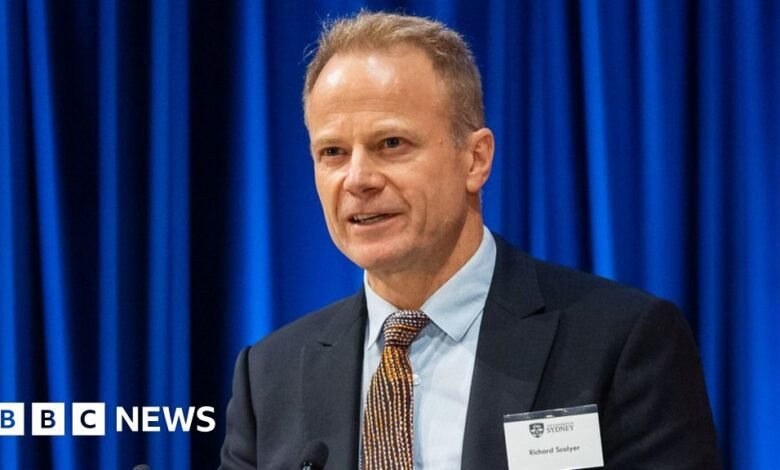Richard Scolyer: Renowned doctor remains brain cancer free after a year

- By Tiffanie Turnbull
- BBC News, Sydney
Image source, Getty Images
A year after undergoing the world’s first treatment for glioblastoma, Australian doctor Richard Scolyer remains cancer-free.
The esteemed pathologist’s experimental therapy is based on his own pioneering melanoma research.
Professor Scolyer’s subtype of glioblastoma is so aggressive that most patients survive less than a year.
But on Tuesday, the 57-year-old announced that his latest MRI scan again showed no recurrence of the tumor.
“I couldn’t be happier!!!!” he wrote in a social media update.
Prof Scolyer is an internationally renowned pathologist and was this year named Australian of the Year, along with his colleague and friend Georgina Long, in recognition of their transformative work on melanoma.
Co-directors of the Melanoma Institute Australia, over the past decade their research into immunotherapy, which uses the body’s immune system to attack cancer cells, has dramatically improved outcomes for patients with advanced melanoma around the world. Half are now essentially cured, compared to less than 10%.
It is this research that Professor Long, along with a team of doctors, is using to treat Prof Scolyer – in the hope of finding a cure for his cancer too.
In melanoma, Professor Long and her team found that immunotherapy works best when a combination of drugs is used and when these are given before any surgery to remove a tumor. And so, Prof Scolyer last year became the first brain cancer patient to receive pre-operative combined immunotherapy.
He is also the first to receive a vaccine personalized according to the characteristics of his tumor, which increases the cancer detection power of the drugs.
The results so far have generated huge excitement – and optimism that the pair may be on the verge of a discovery that could help around 300,000 people diagnosed with brain cancer around the world every year.
Roger Stupp – the doctor after whom the current protocol for treating glioblastomas is named – told the BBC earlier this year that Professor Scolyer’s prognosis was “bleak” and that it was too early to say whether the treatment was working.
He added that while Scolyer’s previous results were “encouraging,” he wanted to see him go 12 months, or even 18, without a recurrence, before getting excited.
Professor Scolyer and Professor Long have previously said that Professor Scolyer’s chances of being cured are “tiny”, but they hope the experimental treatment will extend his life and translate into clinical trials for glioblastoma patients.



